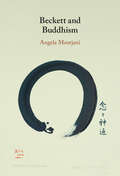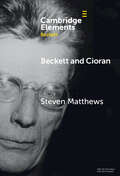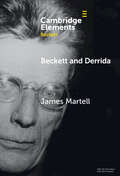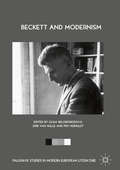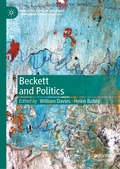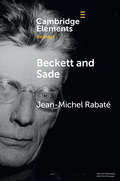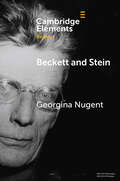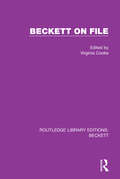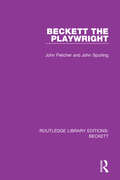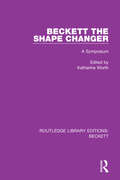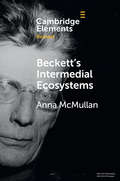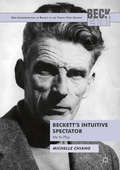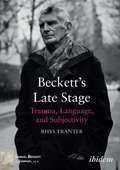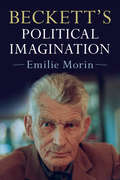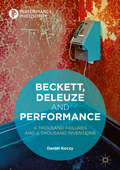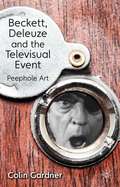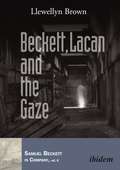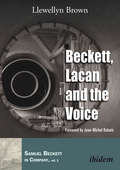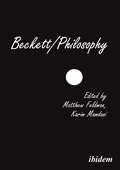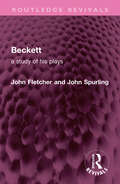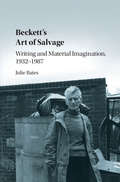- Table View
- List View
Beckett and Buddhism
by Angela MoorjaniBeckett and Buddhism undertakes a twenty-first-century reassessment of the Buddhist resonances in Samuel Beckett's writing. These reverberations, as Angela Moorjani demonstrates, originated in his early reading of Schopenhauer. Drawing on letters and archives along with recent studies of Buddhist thought and Schopenhauer's knowledge of it, the book charts the Buddhist concepts circling through Beckett's visions of the 'human predicament' in a blend of tears and laughter. Moorjani offers an in-depth elucidation of texts that are shown to intersect with the negative and paradoxical path of the Buddha, which she sets in dialogue with Western thinking. She brings further perspectives from cognitive philosophy and science to bear on creative emptiness, the illusory 'I', and Beckett's probing of the writing process. Readers will benefit from this far-reaching study of one of the most acclaimed writers of the twentieth century who explored uncharted topologies in his fiction, theatre, and poetry.
Beckett and Cioran (Elements in Beckett Studies)
by Steven MatthewsThis Element discusses the association between Samuel Beckett, and the Romanian-born philosopher, E. M. Cioran. It draws upon the known biographical detail, but, more substantially, upon the terms of Beckett's engagement with Cioran's writings, from the 1950s to the 1970s. Certain of Cioran's key conceptualisations, such as that of the 'meteque', and his version of philosophical scepticism, resonate with aspects of Beckett's writing as it evolved beyond the 'siege in the room'. More particularly, aspects of Cioran's conclusion about the formal nature that philosophy must assume chime with some of the formal decisions taken by Beckett in the mid-late prose. Through close reading of some of Beckett's key works such as Texts for Nothing and How It Is, and through consideration of Beckett's choices when translating between English and French, the issues of identity and understanding shared by these two settlers in Paris are mutually illuminated.
Beckett and Derrida (Elements in Beckett Studies)
by James MartellUncannily similar projects, Beckett's and Derrida's oeuvres have been linked by literary and philosophy scholars since the 1990s. Taking into consideration their shared historical and personal contexts as writers whose main language of expression was 'adopted' or 'imposed', this Element proposes a systematic reading of their main points of connection. Focusing on their engagement with the intricacies of beginnings and origins, on genetic grounds or surfaces analogous to the Platonic khôra, and on their similar critiques of the aporias of sovereignty, it exposes the reasons why multiple readers, like Coetzee, consider Derridean deconstruction a philosophical mirror of Beckett's literary achievements.
Beckett and Modernism: The Extended Mind And Creative Undoing From Darwin To Beckett And Beyond (Palgrave Studies in Modern European Literature #1)
by Dirk Van Hulle Olga Beloborodova Pim VerhulstThis book of collected essays approaches Beckett’s work through the context of modernism, while situating it in the literary tradition at large. It builds on current debates aiming to redefine ‘modernism’ in connection to concepts such as ‘late modernism’ or ‘postmodernism’. Instead of definitively re-categorizing Beckett under any of these labels, the essays use his diverse oeuvre – encompassing poetry, criticism, prose, theatre, radio and film – as a case study to investigate and reassess the concept of ‘modernism after postmodernism’ in all its complexity, covering a broad range of topics spanning Beckett’s entire career. In addition to more thematic essays about art, history, politics, psychology and philosophy, the collection places his work in relation to that of other modernists such as T. S. Eliot, James Joyce, Wyndham Lewis, Gertrude Stein and Virginia Woolf, as well as to the literary canon in general. It represents an important contribution to both Beckett studies and modernism studies.
Beckett and Politics: Politics, Propaganda And A 'universe Become Provisional' (New Directions in Irish and Irish American Literature)
by William Davies Helen BaileyThis collection of essays reveals the extent to which politics is fundamental to our understanding of Samuel Beckett’s life and writing. Bringing together internationally established and emerging scholars, Beckett and Politics considers Beckett’s work as it relates to three broad areas of political discourse: language politics, biopolitics and geopolitics. Through a range of critical approaches, including performance studies, political theory, gender theory, historicizing approaches and language theory, the book demonstrates how politics is more than just another thematic lens: it is fundamentally and structurally intrinsic to Beckett’s life, his texts and subsequent interpretations of them. This important collection of essays demonstrates that Beckett’s work is not only ripe for political engagement, but also contains significant opportunities for understanding and illuminating the broader relationships between literature, culture and politics.
Beckett and Sade (Elements in Beckett Studies)
by Jean-Michel RabatéMuch has been written on Beckett and Sade, yet nothing systematic has been produced. This Element is systematic by adopting a chronological order, which is necessary given the complexity of Beckett's varying assessments of Sade. Beckett mentioned Sade early in his career, with Proust as a first guide. His other sources were Guillaume Apollinaire and Mario Praz's book, La Carne, La morte e il Diavolo Nella Letteratura Romantica (1930), from which he took notes about sadism for his Dream Notebook. Dante's meditation on the absurdity of justice provides closure facing Beckett's wonder at the pervasive presence of sadism in humans.
Beckett and Stein (Elements in Beckett Studies)
by Georgina NugentWhat motivated Beckett, in 1937, to distance himself from the 'most recent work' of his mentor James Joyce, and instead praise the writings of Gertrude Stein as better reflecting his 'very desirable literature of the non-word'? This Element conducts the first extended comparative study of Stein's role in the development of Beckett's aesthetics. In doing so it redresses the major critical lacuna that is Stein's role and influence on Beckett's nascent bilingual aesthetics of the late 1930s. It argues for Stein's influence on the aesthetics of language Beckett developed throughout the 1930s, and on the overall evolution of his bilingual English writings, arguing that Stein's writing was itself inherently bilingual. It forwards the technique of renarration – a form of repetition identifiable in the work of both authors – as a deliberate narrative strategy adopted by both authors to actualise the desired semantic tearing concordant with their aesthetic praxes in English.
Beckett on File (Routledge Library Editions: Beckett #1)
by Virginia CookeThis book, first published in 1985, assembles essential facts on Samuel Beckett and makes vital but elusive information available. It contains a comprehensive checklist of all the writer’s plays, with a detailed performance history, excerpted reviews, and most importantly, a selection of Beckett’s own comments on their work drawn from essays, interviews, letters and diaries. Other features include a chronology of life and work, a checklist of non-dramatic writings and an annotated bibliography.
Beckett the Playwright (Routledge Library Editions: Beckett #2)
by John Fletcher John SpurlingThis book, first published in 1985, stresses Beckett’s success as an innovator in the theatre through a close reading and analysis of his plays. The differing backgrounds of the two authors enables them to approach Beckett’s drama in a particularly fruitful way: ‘Their analysis is clever yet level-headed, readable but does not shirk complexities.’ (Times Educational Supplement). ‘Brilliant collection of essays on Beckett and his works.’ (Irish Times)
Beckett the Shape Changer: A Symposium (Routledge Library Editions: Beckett #3)
by Katharine WorthThe essays in this book, first published in 1975, suggest how best to approach Beckett, how to read him, how to get closer to the concrete experience offered by this most concrete of writers. It aims to bring out the full diversity of Beckett’s art as dramatist and story-teller. His astonishing flexibility and inventiveness is stressed throughout, either in studies of single novels, or from the whole range of the fiction and stage drama, or from the experiments in other media: the solitary film, the radio plays. Beckett’s bilingualism, one of the strangest aspects of his Proteanism, is examined through a comparison of the French and English texts of some of his stage plays. The emphasis of the essays is literary rather than philosophical: they explore narrative and dramatic processes, the strange partial transitions between them, the fine relations of form and feeling which Beckett aims at through whatever medium he is using, and his humaneness, expressed through the many nuances of his humour. The shorter fiction and the later writings also receive close attention.
Beckett's Art of Mismaking
by Leland de la DurantayeLeland de la Durantaye helps us understand Beckett's strangeness and notorious difficulty by arguing that Beckett's lifelong campaign was to mismake on purpose--not to denigrate himself, or his audience, or reconnect with the child or savage within, but because he believed that such mismaking is in the interest of art and will shape its future.
Beckett's Dedalus
by Peter J. MurphyGiven that the Nobel Prize-winning author Samuel Beckett (1906-1989) was personally acquainted with the modernist master James Joyce, and even helped research and promote Finnegans Wake, it should come as no surprise that Beckett was greatly influenced by Joyce's own work. However, much analysis of Beckett's work tends to argue that he forged his own artistic identity in opposition to Joyce, seeking and eventually finding styles and methods unoccupied by his "mentor." Beckett's Dedalus is a comprehensive reassessment of this line of criticism and traces the nature and extent of Joyce's influence in more complex, contestatory, and complementary ways throughout all of Beckett's major fiction. Paying close attention to the extensive network of allusions Beckett derived from Joyce's writing, P.J. Murphy reveals how Beckett consistently echoed and engaged in dialogue with Joyce's works, especially A Portrait of the Artist as a Young Man and, in particular, its protagonist Stephen Dedalus. This study proposes that the relationship between the two writers was a complex life-giving and art-building dialogue concerned with aesthetic theories, depictions of reality, and the artistic integrity needed to carry out these critical investigations. Beckett's Dedalus is a fascinating study of the literary influence one generation has on the next. It will change the way we consider the relationship between two of the greatest writers of the twentieth century.
Beckett's Intermedial Ecosystems: Closed Space Environments across the Stage, Prose and Media Works (Elements in Beckett Studies)
by Anna McMullanThis Element draws on the concept of ecosystems to investigate selected Beckett works across different media which present worlds where the human does not occupy a privileged place in the order of creation: rather Beckett's human figures are trapped in a regulated system in which they have little agency. Readers, listeners or viewers are complicit in the operation of techniques of observation inherent to the system, but also reminded of the vulnerability of those subjected to it. Beckett's work offers new paradigms and practices which reposition the human in relation to space, time and species.
Beckett's Intuitive Spectator: Me to Play (New Interpretations of Beckett in the Twenty-First Century)
by Michelle ChiangBeckett’s Intuitive Spectator: Me to Play investigates how audience discomfort, instead of a side effect of a Beckett pedagogy, is a key spectatorial experience which arises from an everyman intuition of loss. With reference to selected works by Henri Bergson, Immanuel Kant and Gilles Deleuze, this book charts the processes of how an audience member’s habitual way of understanding could be frustrated by Beckett’s film, radio, stage and television plays. Michelle Chiang explores the ways in which Beckett exploited these mediums to reconstitute an audience response derived from intuition.
Beckett's Late Stage: Trauma, Language, and Subjectivity (Samuel Beckett in Company #4)
by Rhys TranterBeckett's Late Stage reexamines the Nobel laureate's postwar prose and drama in the light of contemporary trauma theory. Through a series of sustained close readings, the study demonstrates how the comings and goings of Beckett's prose unsettles the Western philosophical tradition; it reveals how Beckett's live theatrical productions are haunted by the rehearsal of traumatic repetition, and asks what his ghostly radio recordings might signal for twentieth-century modernity. Drawing from psychoanalytic and poststructuralist traditions, Beckett's Late Stage explores how the traumatic symptom allows us to rethink the relationship between language, meaning, and identity after 1945.
Beckett's Political Imagination
by Emilie MorinBeckett's Political Imagination charts unexplored territory: it investigates how Beckett's bilingual texts re-imagine political history, and documents the conflicts and controversies through which Beckett's political consciousness and affirmations were mediated. The book offers a startling account of Beckett's work, tracing the many political causes that framed his writing, commitments, collaborations and friendships, from the Scottsboro Boys to the Black Panthers, from Irish communism to Spanish republicanism to Algerian nationalism, and from campaigns against Irish and British censorship to anti-Apartheid and international human rights movements. Emilie Morin reveals a very different writer, whose career and work were shaped by a unique exposure to international politics, an unconventional perspective on political action and secretive political engagements. The book will benefit students, researchers and readers who want to think about literary history in different ways and are interested in Beckett's enduring appeal and influence.
Beckett, Deleuze and Performance: A Thousand Failures and A Thousand Inventions (Performance Philosophy)
by Daniel KoczyThis book draws on the theatrical thinking of Samuel Beckett and the philosophy of Gilles Deleuze to propose a method for research undertaken at the borders of performance and philosophy. Exploring how Beckett fabricates encounters with the impossible and the unthinkable in performance, it asks how philosophy can approach what cannot be thought while honouring and preserving its alterity. Employing its method, it creates a series of encounters between aspects of Beckett’s theatrical practice and a range of concepts drawn from Deleuze’s philosophy. Through the force of these encounters, a new range of concepts is invented. These provide novel ways of thinking affect and the body in performance; the possibility of theatrical automation; and the importance of failure and invention in our attempts to respond to performance encounters. Further, this book includes new approaches to Beckett’s later theatrical work and provides an overview of Deleuze’s conception of philosophical practice as an ongoing struggle to think with immanence.
Beckett, Deleuze and the Televisual Event
by Colin GardnerAn expressive dialogue between Deleuze's philosophical writings on cinema and Beckett's innovative film and television work, the book explores the relationship between the birth of the event - itself a simultaneous invention and erasure - and Beckett's attempts to create an incommensurable space within the interstices of language as a (W)hole.
Beckett, Lacan and the Gaze (Samuel Beckett in Company #6)
by Llewellyn BrownForming a pair with the voice, the gaze is a central structuring element of Samuel Beckett’s creation. And yet it takes the form of a strangely impersonal visual dimension testifying to the absence of an original exchange of gazes capable of founding personal identity and opening up the world to desire. The collapse of conventional reality and the highlighting of seeing devices—eyes, mirrors, windows—point to the absence of a unified representation. While masks and closed spaces show the visible to be opaque and devoid of any beyond, light and darkness, spectres—manifestations without origin—reveal a realm beyond the confines of identity, where nothing provides a mediation with the seen, or sets it within perspective. Finally, Beckett’s use of the audio-visual media deepens his exploration of the irreducibly real part of existence that escapes seeing.This study systematically examines these essential aspects of the visual in Beckett’s creation. The theoretical elaborations of Jacques Lacan—in relation with corresponding developments in the history and philosophy of the visual arts—offer an indispensible framework to understand the imaginary not as representation, but as rooted in the fundamental opacity of existence.
Beckett, Lacan, and the Voice
by Jean-Michel Rabaté Llewellyn BrownThe voice traverses Beckett's work in its entirety, defining its space and its structure. Emanating from an indeterminate source situated outside the narrators and characters, while permeating the very words they utter, it proves to be incessant. It can alternatively be violently intrusive, or embody a calming presence. Literary creation will be charged with transforming the mortification it inflicts into a vivifying relationship to language. In the exploration undertaken here, Lacanian psychoanalysis offers the means to approach the voice's multiple and fundamentally paradoxical facets with regards to language that founds the subject's vital relation to existence. Far from seeking to impose a rigid and purely abstract framework, this study aims to highlight the singularity and complexity of Beckett's work, and to outline a potentially vast field of investigation.
Beckett, Lacan, and the Voice (Samuel Beckett in Company #1)
by Llewellyn BrownThe voice traverses Beckett's work in its entirety, defining its space and its structure. Emanating from an indeterminate source situated outside the narrators and characters, while permeating the very words they utter, it proves to be incessant. It can alternatively be violently intrusive, or embody a calming presence. Literary creation will be charged with transforming the mortification it inflicts into a vivifying relationship to language. In the exploration undertaken here, Lacanian psychoanalysis offers the means to approach the voice's multiple and fundamentally paradoxical facets with regards to language that founds the subject's vital relation to existence. Far from seeking to impose a rigid and purely abstract framework, this study aims to highlight the singularity and complexity of Beckett's work, and to outline a potentially vast field of investigation.
Beckett, Modernism and the Material Imagination
by Steven ConnorSteven Connor, one of the most influential critics of twentieth-century literature and culture, has spent much of his career writing and thinking about Samuel Beckett. This book presents Connor's finest published work on Beckett alongside fresh essays that explore how Beckett has shaped major themes in modernism and twentieth-century literature. Through discussions of sport, nausea, slowness, flies, the radio switch, religion and academic life, Connor shows how Beckett's writing is characteristic of a distinctively mundane or worldly modernism, arguing that it is well-attuned to our current concern with the stressed relations between the human and natural worlds. Through Connor's analysis, Beckett's prose, poetry and dramatic works animate a modernism profoundly concerned with life, worldly existence and the idea of the world as such. Lucid, provocative, wide-ranging, and richly informed by critical and cultural theory, this book is required reading for anyone teaching or studying Beckett, modernism and twentieth-century literary studies.
Beckett/Philosophy: A Collection
by Karim Mamdani Matthew Feldman"Beckett criticism has been greatly enhanced, and sometimes chastened, by genetic scholarship, as this anthology... attests."—Andre Furlani, Modernism/Modernity"This collection of essays... represents the most comprehensive analysis of Beckett's relationship to philosophy in print, how philosophical issues, conundrums, and themes play out amid narrative intricacies. The volume is thus both an astonishingly comprehensive overview and a series of detailed readings of the intersection between philosophical texts and Samuel Beckett's oeuvre, offered by a plurality of voices and bookended by an historical introduction and a thematic conclusion."—S. E. Gontarski, Journal of Beckett Studies"Helps us to consider not only how Beckett made use of philosophy but how his own thought might be understood philosophically."—Anthony Uhlmann, University of Western Sydney
Beckett: A Study of his Plays (Routledge Revivals #2)
by John Fletcher John SpurlingFirst published in 1978, Beckett examines the plays of Beckett in the order in which they were written. The book affords a lively and fresh introduction to Beckett’s theatre. Both authors stress that ‘Beckett was waiting for the theatre as the theatre was waiting for Beckett.’ The differing backgrounds of the two authors of this study have enabled them to approach Beckett’s drama in a particularly fruitful way. This book will be of interest to students of literature and drama.
Beckett’s Art of Salvage
by Julie BatesThis innovative exploration of the recurring use of particular objects in Samuel Beckett's work is the first study of the material imagination of any single modern author. Across five decades of aesthetic and formal experimentation in fiction, drama, poetry and film, Beckett made substantial use of only fourteen objects - well-worn not only where they appear within his works but also in terms of their recurrence throughout his creative corpus. In this volume, Bates offers a striking reappraisal of Beckett's writing, with a focus on the changing functions and impact of this set of objects, and charts, chronologically and across media, the pattern of Beckett's distinctive authorial procedure. The volume's identification of the creative praxis that emerges as an 'art of salvage' offers an integrated way of understanding Beckett's writing, opens up new approaches to his work, and offers a fresh assessment of his importance and relevance today.
